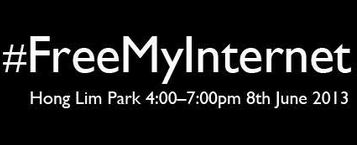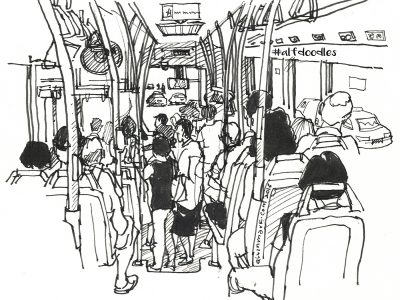[言語コードのないリンク先は、すべて英語のサイトです]
シンガポールのニュースサイトに対する新しい免許制度がメディア開発庁(MDA)によって発表されると、多くのネットユーザーはすぐにそれを検閲だとして非難した。このことを憂慮するネットユーザーのグループはFree My Internetと呼ばれる運動を起こし、市民に対して、議論となっているこの規制を中止させるために2013年6月8日土曜日の大会に参加するように求めている。
新しい規則の下では、月当たり50,000のユニークIPからの閲覧があるニュースサイトは、免許を取得しなければならない。さらに50,000ドルの「運用保証金」を納めなければならない。また以下の規定に対しても、多くのネットユーザーは怒りと不安を覚えている。
The Licence also makes it clear that online news sites are expected to comply within 24 hours to MDA’s directions to remove content that is found to be in breach of content standards.
この免許制度には、オンラインのニュースサイトは内容に関する基準に違反しているものが見つかった場合、MDAからの削除命令に24時間以内に応じなければならない、とも明記されている。
これまでのところ政府は、Yahoo! Singaporeを含む10のウェブサイトについて、この規則の対象になると認めている。
Free My Internet (#freemyinternet) 運動は、この免許制度によってシンガポールでのインターネットの自由と言論の自由が損われるのではないかと考えて、次のように述べている。
We encourage all Singaporeans who are concerned about our future and our ability to participate in everyday online activities and discussions, and to seek out alternative news and analysis, to take a strong stand against the licensing regime which can impede on your independence.
我々は、自分たちの未来と権利を考えるシンガポール市民が日常的にオンラインでの活動・議論に参加し、様々なニュースと分析を求めることを奨励する。そして、市民の独立を妨げかねない免許制度に対しては、強い立場をとることを促す。
ブロガーはこの措置から免除されると政府が保証しているにもかかわらず、いまだにネット規制の影響に晒される可能性があると、警鐘を鳴らす嘆願書もある。
Even though MDA said that blogs do not fall under the licensing scheme, this is not reflected in the wording of the legislation. It leaves the door open for blogs or any other site to be forced to license in the future without any change in the law.
たとえMDAがブログには免許制度は適用されないと言ったとしても、それは法文を反映したものではない。ブログもしくはその他ウェブサイトは、この先、法律の変更がなくても、免許制度が課される可能性が残されている。
社会政治に関するブロガーやコメンテーターは、次のような共同声明を発信している。
As part of the community of websites in Singapore that provide sociopolitical news and analysis to Singaporeans, we are concerned about the impact of the newly-introduced requirement on fellow Singaporeans’ ability to receive diverse news information.
The new licensing regime has the very real potential to reduce the channels available to Singaporeans to receive news and analysis of the sociopolitical situation in Singapore and it is in the interest of all Singaporeans to guard against the erosion and availability of news channels that Singaporeans should rightfully have access to.
シンガポール市民に対して社会政治のニュースと分析を提供するウェブコミュニティの一員として、新しく導入されたこの要求が、多様なニュースを受け取る権利に影響を与えるのではないかと心配している。
新しい免許制度によって、シンガポール国民が社会政治情勢のニュースと分析を受け取るための手段が減ってしまう可能性は、極めて現実的なものだ。様々なニュースにアクセスする正当な権利を守ることは、すべてのシンガポール人にとって利益となる。
増大する批判に対し、MDAは、免許制度は妥当だとして次のように述べている。
An individual publishing views on current affairs and trends on his/her personal website or blog does not amount to news reporting.
…content guidelines are focused on core content concerns that would threaten the social fabric and national interests of our country. Examples include content that incites racial or religious hatred; misleads and causes mass panic; or advocates or promotes violence.
The framework is not an attempt to influence the editorial slant of news sites
時事問題や流行に関して個人が自分のWebサイトやブログで発表する意見は、ニュース報道とは見なされない。
……コンテンツのガイドラインでは、シンガポールの社会構造や国益を脅かしうるコンテンツにとくに焦点を当てている。例えば、人種や宗教の嫌悪をあおったり、大衆を欺きパニックを引き起こしたり、暴力の支持や助長を行うコンテンツのことだ。
この規制はニュースサイトの編集方針に、影響を及ぼそうとしているわけではない。
visakan veerasamy は、MDAの計画がシンガポールのネット利用者をひとつに結びつけていると指摘する。
Maybe a few years from now the MDA licensing thing will be remembered as the issue that got bloggers and alt-news agencies coming together against a common threat to have a national conversation of their own.
They propose a terrible idea, and then piss off the masses enough to inspire a co-ordinated response. Boom, active and engaged citizenry. This is great for Singapore.
おそらく2、3年後には、MDAによる免許制度の問題はこう記憶されているだろう。国について語ることが脅かされるという問題に対して、ブロガーとオルタナティブなニュースメディアがひとつになって抵抗した、と。
彼らはひどいアイデアを出してきた。民衆はそれに反感を覚え、一体となって反応した。勢いがあり、自発的で、関わりを持つ市民。これはシンガポールにとってすばらしいことだ。
Jentrified Citizen は厳しすぎる政策だとして、と次のように書いている。
The Government is well aware of the power of the Internet and how it is fast igniting the people’s conscience and socio-political consciousness. This is why they are trying to cut off our oxygen with more draconian measures. And they are in a position to do so as they have absolute power and control over almost everything in tiny Singapore.
政府はインターネットの力をよくわかっているし、インターネットが人々の良心と社会政治意識に火を付けるのがどれだけ早いのかもわかっている。だからこそ、もっと厳しい政策でその息の根を止めようとしているのだ。このようなことができるのは、政府が絶対的権力を持っていて、この小さなシンガポールのほとんどすべてをコントロールできる地位にいるからだ。
規則内の文言があいまいなため、人気のあるニュースブログは依然として免許を取得するよう命じられる可能性がある。それは全てMDAのさじ加減ひとつなのだ。 Jeannette Chong-Aruldossは、MDAに与えられているこの権力に不満を抱いている。
It is discomforting that the Minister has the discretion, the limits of which is still unclear, to decide whether and when a website should be licensed.
苛立ちを覚えるのは、ウェブサイトが認可されるべきか、それはいつであるべきかに関して大臣が自由裁量を持っていて、その権力の範囲がいまだ不透明なことである。
Z’ming Cikは、政治ブログに対する免許制度の影響力に警鐘を鳴らしている。
The new rules will serve to deter bloggers in Singapore from discussing social and political issues, and encourage people to blog about facial cream or their pet dogs instead.
This would presumably help create a ‘safe’ environment for the ruling party’s continual domination in Singapore, free from criticisms.
新しい規則は、ブロガーが社会政治問題について議論するのを思いとどまらせ、その代わりに洗顔クリームやペットの犬に関してブログを書くよう勧めているのだ。
これは恐らく、与党にとって批判されない「安全な」環境を作ることに役立っている。そうすることが支配の存続に必要なのだ。
publichouse.sg は、なぜシンガポール人がこの政策に反対すべきかを議論している。
…because this new rule affects not only moderators and contributors of online news sites but also their readers, all Singaporeans should fight to protect their rights and voice their opposition of the rule. It is most certainly not in the interest of the people to have what they read censored or controlled, especially when the primary purpose of online news sites is to provide alternatives to the mainstream media.
……なぜならこの新しい規則は、オンラインニュースサイトの運営者や寄稿者だけではなく、その読者にも影響を及ぼす。シンガポール人は権利を守るために戦い、規則に反対する声を上げるべきだ。読んでいる記事が検閲され、制御されるということは、きっと人々の利益にはならない。オンラインニュースサイトの第一の目的が主流メディアが報じないことを伝えることである場合には、とくにそうなのだ。
Siew Kum Hong は、今回の統制が世界におけるシンガポールのイメージをさらに壊さないかどうか不安視している。
This new regulation is a mistake, and reinforces the perception that Singapore is a repressive place — which is precisely the wrong message to be sending to a globalised and networked world, when you are trying to build an innovative and creative economy where freedom of thought is so essential.
この新しい規制は失敗である。シンガポールは弾圧のある国家だという印象を強めてしまう。シンガポールが革新的で創造的な経済を作りたい時に、グローバルでネットワーク化された世界に送るメッセージとしては間違っている。そういう経済では思想の自由はとても重要なものなのだ。








